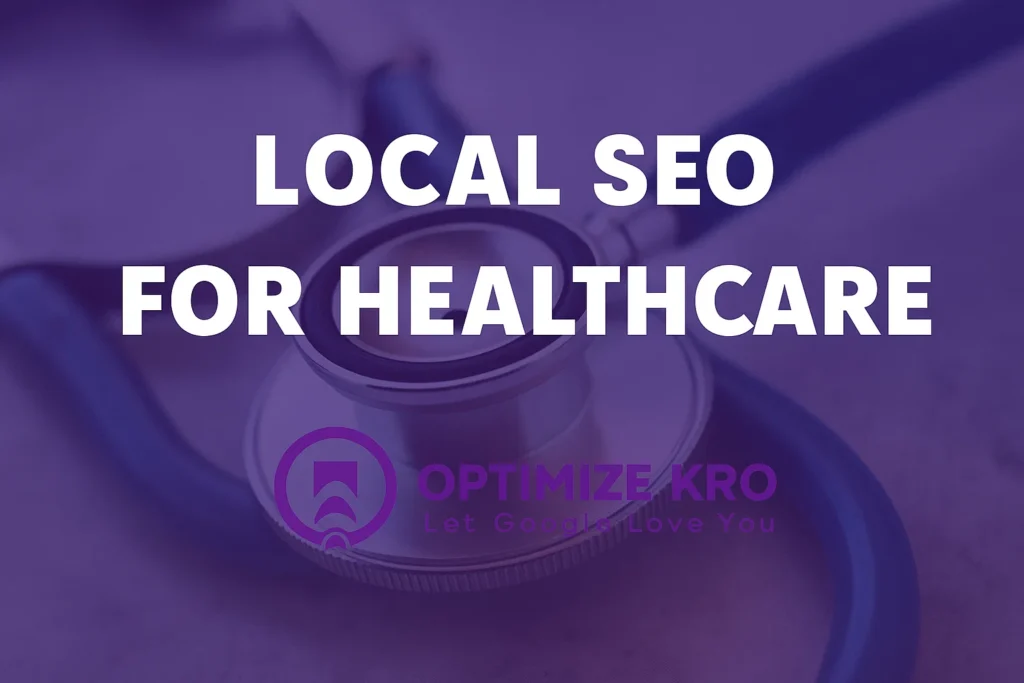In today’s digital landscape, local search engine optimization (SEO) is an essential strategy for healthcare providers looking to attract patients from their local area. When patients search for healthcare services, they often seek providers near them. As a result, healthcare organizations must leverage local SEO to increase their visibility and ensure potential patients can easily find their services.
In this detailed guide, we will discuss everything you need to know about local SEO for healthcare, including its importance, how to optimize your website, and some actionable tips to boost your rankings. By the end of this article, you’ll have a clear understanding of how local SEO can enhance your healthcare practice’s online presence.

What is Local SEO for Healthcare?
Local SEO refers to the process of optimizing your website and online presence to rank higher in local search engine results. For healthcare providers, local SEO means appearing in search results when potential patients search for healthcare services in your area.
When someone searches for “dentist near me,” “pediatrician in [city name],” or “urgent care near me,” they are likely to find healthcare providers within their geographic area. Local SEO focuses on ranking your healthcare practice on these local search results, ensuring that you appear on Google Maps, Google’s Local Pack, and other local directories.
Why is Local SEO Important for Healthcare?
The significance of local SEO for healthcare providers cannot be overstated. Here are several key reasons why it’s essential for your practice:
1. Increased Visibility for Local Patients
Patients are increasingly turning to search engines to find healthcare providers near them. According to Google, nearly 50% of people who conduct a local search on their mobile device visit a store or clinic within 24 hours. Optimizing your practice for local SEO ensures that you show up in these search results, increasing the likelihood of attracting new patients.
2. Competitive Advantage
With so many healthcare providers competing for attention, local SEO can give you an edge over your competitors. By optimizing your site for local search, you increase your chances of standing out in a crowded market.
3. Better Conversion Rates
People searching for healthcare services are typically looking to make a decision soon. Local search results are highly targeted, meaning that when people find your practice, they’re more likely to book an appointment or reach out for services. By appearing in local search results, you can directly convert search traffic into patients.
4. Trust and Credibility
Appearing in Google’s Local Pack or Google Maps enhances your credibility. When your practice shows up in these highly visible search results, patients are more likely to trust your healthcare services.
How Local SEO Works for Healthcare
1. Google My Business (GMB) Optimization
Google My Business (GMB) is one of the most important tools for local SEO. By creating and optimizing your GMB profile, you can ensure that your healthcare practice appears in Google’s local search results and maps.
Key Tips for Optimizing Google My Business for Healthcare:
- Claim and verify your GMB listing: Ensure that your practice’s name, address, and phone number (NAP) are consistent across all platforms.
- Add detailed business information: Include your website, business hours, specialties, and services offered.
- Encourage patient reviews: Positive reviews are vital for local SEO rankings. Ask satisfied patients to leave reviews and respond to them regularly.
- Use high-quality images: Upload pictures of your office, staff, and facilities to make your profile more engaging.
- Add posts to your GMB profile: Post updates about new services, blog posts, promotions, or any other news related to your practice.
2. Local Keyword Optimization
When people search for healthcare services, they use specific keywords. To rank for these terms, it’s important to target local keywords that match the services you offer and your geographic location.
Example Keywords:
- “Pediatrician in [City Name]”
- “Best dentist near me”
- “Emergency care [City Name]”
- “Orthopedic doctor [City Name]”
3. On-Page SEO for Healthcare Websites
Optimize your website content for local SEO by incorporating local keywords naturally throughout your content. Some on-page SEO tips for healthcare websites include:
- Meta tags and titles: Use local keywords in your page titles, meta descriptions, and header tags (H1, H2).
- Optimize for mobile: A significant amount of local searches happen on mobile devices, so make sure your website is mobile-friendly.
- Use schema markup: Implement local business schema markup on your website. This helps search engines understand the location and services of your practice.
4. Local Citations and Directories
Local citations are mentions of your business name, address, and phone number (NAP) on third-party websites, such as online directories. The more consistent and authoritative your NAP information appears on these sites, the better your local SEO performance will be.
Key Citation Sites for Healthcare Providers:
- Healthgrades
- Yelp
- Yellow Pages
- Better Business Bureau (BBB)
- Vitals
5. Patient Reviews and Testimonials
Patient reviews play a major role in your local SEO efforts. Reviews not only improve your ranking but also enhance your practice’s reputation. The more positive reviews you have, the higher you’ll rank in local search results.
Key Local SEO Strategies for Healthcare
1. Create Location-Specific Content
Creating content tailored to your local audience can help boost your local SEO rankings. For instance, write blog posts about common health concerns in your area or medical trends that are specific to your location. This will attract search traffic from your local audience and improve your authority.
2. Optimize Your Website for Local Search Intent
Optimize your healthcare website to address the needs of patients who are looking for nearby services. Include location-based keywords in your title tags, meta descriptions, and body content.
3. Build Local Backlinks
Building high-quality backlinks from local sources like newspapers, local events, and other reputable local websites can increase your domain authority and improve your local SEO.
4. Engage on Social Media
Engagement on social media platforms can also boost local SEO. Ensure your practice’s social media profiles contain location-based keywords and regularly post updates about your services, patient stories, or local events.
5. Create a Blog and Publish Local Health Tips
Blogging can help increase your website’s visibility on search engines. Focus on publishing health-related content that resonates with local patients. For instance, write about healthcare concerns specific to your area or the common diseases affecting people in your region.
Table: Key Local SEO Ranking Factors for Healthcare
| Ranking Factor | Importance Level | Description |
|---|---|---|
| Google My Business Optimization | High | Crucial for visibility in local search results. |
| Consistent NAP Information | High | Ensures search engines know where you are located. |
| Reviews and Ratings | High | Positive reviews improve local rankings. |
| Mobile-Friendly Website | Medium | Google prioritizes mobile-responsive websites. |
| Local Backlinks | Medium | Links from local websites improve authority. |
| Localized Content | Medium | Content relevant to your location boosts SEO. |
Frequently Asked Questions (FAQ)
1. How long does it take to see results with local SEO?
Local SEO can take anywhere from a few weeks to several months to show noticeable results. Factors like competition, the quality of your SEO efforts, and how well you optimize your GMB listing can influence how quickly you see results.
2. How do I get more reviews for my healthcare practice?
Encourage patients to leave reviews after their appointments. You can also send follow-up emails asking for reviews or include a reminder in your practice’s waiting room.
3. What are the most important local directories for healthcare businesses?
Some of the most important local directories for healthcare businesses include Google My Business, Yelp, Healthgrades, Yellow Pages, and Vitals. Ensure your practice is listed on these sites and that your NAP information is consistent.
4. Can I optimize my healthcare website for voice search?
Yes, optimizing your website for voice search is crucial as more people use voice assistants like Google Assistant or Siri to find healthcare services. Focus on natural language and long-tail keywords to optimize for voice search.
5. Is it important to optimize for mobile users in local SEO?
Yes, mobile optimization is crucial for local SEO. With the rise in mobile searches, Google prioritizes mobile-friendly websites in search results. Ensure that your website is responsive and loads quickly on mobile devices.
Conclusion
Local SEO for healthcare is a game-changer for practices looking to attract more patients and stand out in a competitive market. By optimizing your website, creating relevant local content, and engaging with your community online, you can boost your practice’s visibility and establish your reputation as a trusted healthcare provider in your area.
Implementing the strategies discussed in this article will help you build a solid foundation for local SEO success, improve your search rankings, and drive more traffic to your practice.

